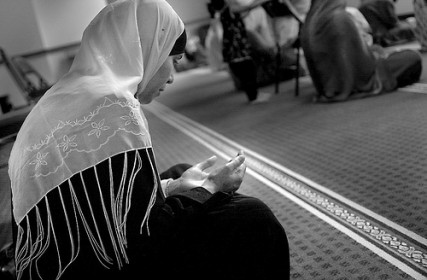
Tucked beneath the study abroad house, kitty corner to the Knights of Columbus bar, there’s a tiny room. It’s unassuming; the ceilings are low, not oppressive. The Muslim prayer room isn’t a mosque, but it’s a quiet, dedicated place for Gonzaga University's Muslim student population to pray and reflect.
Sophomore Haitham Al Mhana said support like this exemplifies GU’s welcoming nature. Al Mhana, the president of the Saudi Arabian Student Club, has been in the U.S. for two years. Originally from Al Dakhla, a small town in central Saudi Arabia, Al Mhana said the American embassy recommended GU. Al Mhana said it has been everything he’s hoped.
“Priests are supposed to be like the religious people here, they are not only people for Catholics to talk to; they are open to everyone,” he said. “If I have questions about other religions, if I want to get more information, if I want to have a discussion, all that kind of stuff, they actually have enough knowledge and they are the people I’d go to.”
This is exactly the kind of support the Rev. C. Hightower said the University Ministry is supposed to provide.
“All our programming is open to all our students,” he said. “Everything we do is ecumenical. So, the goal of University Ministry is not to convert, and it’s actually against school policy … So, if you come as a Catholic, we want you to leave as a stronger Catholic. If you come as a Muslim, we want you to leave as a stronger Muslim.”
This attitude isn’t just lip service. In fact, for a number of years GU has donated money to the Spokane Islamic Center. Starting in 1984, Vice President of Finance Chuck Murphy said GU was given a gift of $150,000 to “establish a mosque for Muslim students and to support on-campus cultural activities for international students at Gonzaga.” Initially a “portion of these funds” were used to build an on-campus prayer room and support a small mosque located in north Spokane. The rest was placed in a sort of endowment fund, he said. The interest earned from this fund was then used to support the prayer room and mosque, as well as “cultural activities.”
The prayer room and the north Spokane mosque, Murphy said, were active at GU for 20 years and served GU students, as well as the Spokane community at large. However, as need grew, the small mosque being used by local Muslims was too small. So, in 2004 when the Spokane Islamic Center started fundraising to build a new larger mosque in Spokane Valley, GU donated $30,000 from the endowment fund. Additionally, GU pledged to annually contribute $15,000 for the next eight years, Murphy said.
“We meet on an annual basis with the leadership of the Islamic Center to discuss how to continue to best meet the needs of our Islamic students,” he said. “It has been a very good relationship.”
However, despite the obvious support, both monetarily and relationally, GU’s Muslim student population, or more accurately Arabic student population, has fluctuated.
In 2003, when Amber McKenzie, the assistant director of the International Student Program started working at GU, she said there were no Muslim exchange students. Before Sept. 11, she said, GU had a large Muslim population, however, after the Twin Tower attacks, that exchange population all but dried up.
Hightower said this had nothing to do with GU’s admission policy and more to do with stricter visa requirements. There was, he said, a “lot of bias and uneducated ill-informed responses to the tragedy surrounding a terrorist act,” however, this wasn’t, in his memory, ever much of an issue at GU.
Since then, the numbers have ballooned. The majority of GU’s Muslim population is from Saudi Arabia due to the King Abdullah scholarship program, according to McKenzie. Started in 2005, this exchange program sends thousands of young Saudi men and women all over the world for higher education. This program has revitalized GU’s Saudi population. Currently, McKenzie said, there are 60 Saudis in the English as a Second Language program, 36 undergraduates and nine graduate students. While other countries are represented, she said, it’s predominantly Saudi.
This means it’s vital that these students have a place to practice their religion. While GU doesn’t have a dedicated mosque, she said, there are several spots where Muslim students can pray. The first, underneath the study abroad house, is primarily used by undergraduate students. In Schoenberg, where ESL (English as Second Language) students spend the majority of their time, there are two rooms that are available for students to pray, one for women and one for men. While it’s not an officially dedicated room, she said the students know that it’s available.
As for the Spokane Valley mosque, Al Mhana said it’s nice to have that option. However, he said that many students wish that the prayer room underneath the study abroad house was open on Fridays. Fridays are the Islamic traditional day of group worship, however, for many students it’s hard to find the time to travel to the valley to worship.
Hightower said that the prayer room is closed then, per the Spokane Islamic Center’s imam request. The room is open the rest of the week, but is reserved specifically for Muslim students, he said.
Overall, Al Mhana said he feels GU is doing a good job of welcoming students from diverse backgrounds.
“(It’s) very accepting,” Al Mhana said. “Yes, I feel very, very close to the Jesuit institution.”









GU is a great example for religious tolerance… Despite conflicts and misconceptions, KSA and the US maintain a very good relationship on several levels.